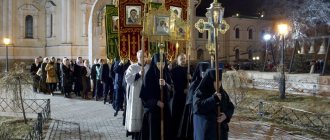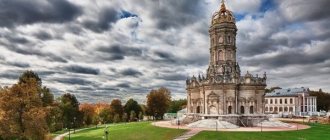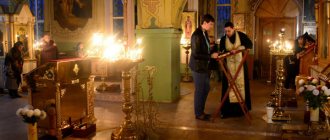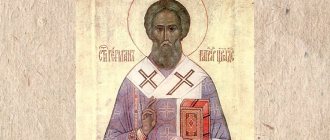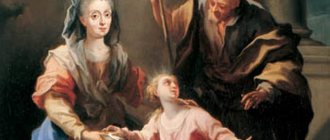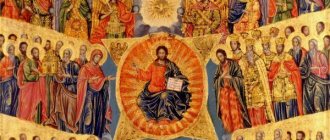How does the Liturgy take place in the Orthodox Church?
Usually the Liturgy is celebrated on Sundays or holidays, but in large churches it can take place daily.
Most often, the morning time is chosen for the Eucharist (on some holidays there are also afternoon services). Duration of service is approximately 1.5-2 hours.
The rite of the Liturgy is performed according to the Jerusalem Rule, and its complete scheme is available only to ministers of the Church. But knowledge of the general order of actions and explanations for the stages of worship is desirable for every Christian in order to correctly understand the spiritual wealth accumulated over the centuries.
Nowadays there are 4 liturgical rites celebrated in churches at different times:
- St. John Chrysostom - is performed every day, and during the Lenten Triodion - on Saturdays and Palm Sunday;
- St. Basil the Great - served on Christmas Eve, Lent and Holy Week;
- St. Gregory the Dvoeslov - during Lent, except on weekends;
- Apostle James - is performed on the day of remembrance of the martyr.
The bishop's Liturgy is also distinguished by greater solemnity and duration.
Prokeemnas and alleluiaries of the days of the week
- On Monday
- On Tuesday
- On Wednesday
- On Thursday
- On Friday
- On Saturday
See: Alleluiary, Prokeimenon.
On Monday
Prokeimenon, tone 4: The angels create His spirits, / and the servants His fiery flame.
Translation: You create Your angels as spirits, / and Your servants as flames of fire (Ps. 103:4).
Verse: Bless the Lord, my soul, O Lord my God, you are greatly magnified.
Translation: Bless the Lord, my soul! O Lord my God, You are greatly exalted (Ps. 103:1).
Alleluia, tone 5: Praise the Lord, all His angels; praise Him, all your mighty powers.
Translation: Praise Him, all His angels; praise Him, all His armies (Ps. 149:2).
Verse: As He spoke and was, He commanded and was created.
Translation: For He spoke and they came into being, He commanded and they were created (Ps. 149:5).
On Tuesday
Prokeimenon, tone 7: The righteous will rejoice in the Lord / and trust in Him.
Translation: The righteous rejoice in the Lord, / and trust in Him (Ps. 63:11).
Verse: Hear, O God, my voice; I always pray to You.
Translation: Hear, O God, my voice when I pray to You (Ps. 63:2).
Alleluia, tone 4: The righteous will flourish like the phoenix, like the cedar tree of Lebanon.
Translation: The righteous shall blossom like the palm tree, and like the cedar of Lebanon he shall multiply (Ps. 91:13).
Verse: Plant plants in the house of the Lord, in the palace of our God they will flourish.
Translation: Those planted in the house of the Lord in the courts of our God will flourish (Ps. 91:14).
On Wednesday
Prokeimenon, tone 3, song of the Mother of God: My soul magnifies the Lord, / and my spirit rejoices in God my Savior.
Translation: My soul magnifies the Lord, / and my spirit rejoices in God my Savior (Luke 1:46-47).
Verse: As I have looked upon the humility of my servant, behold, from now on all my fathers will bless me.
Translation: That He had regard for the humility of His servant; for behold, from now on all generations will call Me blessed (Luke 1:48).
Alleluia, tone 8: Hear, O Daughters, and see, and incline Your ear.
Translation: Hear, O Daughter, and look, and incline Your ear (Ps. 44:11).
Verse: The riches of mankind will pray to Your face.
Translation: The rich of the people will plead for Your face (Ps. 44:13).
On Thursday
Prokeimenon, tone 8: Their message went out into the whole earth, / and their words to the ends of the world.
Translation: Their voice went out into all the earth, / and their speech to the ends of the world (Ps. 18:5).
Verse: The heavens tell the glory of God, but the firmament declares His handiwork.
Translation: The heavens proclaim the glory of God, but the firmament declares the work of His hands (Ps. 18:2).
Alleluia, tone 1: The heavens will confess Your wonders, O Lord, for Your truth is in the Church of saints.
Translation: The heavens will declare Your wonders, O Lord, and Your truth in the assembly of the saints (Ps. 88:6).
Verse: We glorify God in the council of saints.
Translation: God is glorified in the company of saints (Ps. 88:8).
On Friday
Prokeimenon, tone 7: Lift up the Lord our God, and worship His footstool, / for He is holy.
Translation: Exalt the Lord our God and worship His footstool, / for it is holy (Ps. 98:5).
Verse: The Lord reigns, let the people be angry.
Translation: The Lord reigns: let the nations be angry (Ps. 98:1).
Alleluia, tone 1: Remember Your host, which You acquired from the beginning.
Translation: Remember Your company, which You acquired from the beginning (Ps. 73:2).
Verse: God is our King from before the age, He brought salvation into the midst of the earth.
Translation: But God, our King from before the ages, wrought salvation in the midst of the earth (Ps. 73:12).
On Saturday
Prokeimenon, tone 8: Rejoice in the Lord, / and rejoice in righteousness.
Translation: Rejoice in the Lord, / and rejoice, ye righteous (Ps. 31:11).
Verse: Blessed are those who abandoned iniquity and those who took refuge in sin.
Translation: Blessed are those whose iniquities are forgiven and whose sins are covered (Ps. 31:1).
And to the dead: Prokeimenon, tone 6: Their souls / will settle in good things.
Translation: Their souls will be found among good things (Ps. 24:13).
Alleluia, voice 4: The righteous cried, and the Lord heard them, and delivered them from all their sorrows.
Translation: The righteous called, and the Lord heard them, and delivered them from all their sorrows (Ps. 33:18).
Verse: Many are the tribulations of the righteous, and the Lord will deliver them from all of them.
Translation: Many are the sorrows of the righteous, and the Lord will deliver them from all of them (Ps. 33:20).
Verse: Blessed ones, whom you have chosen and accepted, O Lord, and their memory for generations and generations.
Translation: Blessed is he whom You have chosen and brought near, O Lord. And their memory will last forever (Ps. 64:5, 44:18).
What is Liturgy and what parts does it consist of?
The content of the Liturgy dates back to early Christianity. It’s not for nothing that its second name is Bloodless Sacrifice. During the service, all the events of the Savior’s life before the Ascension are listed, and the moment of Communion symbolizes the Divine sacrifice for the atonement of all sins. Therefore, everyone who sincerely accepts the Holy Gifts is freed from sins, cleansing their soul and body.
The sequence of the Liturgy is unchanged and consists of several parts:
Watch
Immediately before the start of the Liturgy, the altar server reads the 3rd and 6th hours - short prayers remembering the descent of the Holy Spirit on the apostles and the crucifixion of the Lord Jesus Christ. They are called to turn the thoughts of parishioners to the Lord God.
Proskomedia
Tells about the earthly life of Christ. At this moment, the prosphora is prepared and cut. The altar remains closed during the entire first part of the Liturgy, and the Proskomedia is read on the Altar.
Liturgy of the Catechumens
This part of the service is dedicated to those preparing to receive Communion. The deacon says short prayers for the sick, the suffering, those in grief, for peace and healing of the sick, for the Orthodox Church and the Patriarch.
After this comes the Great Litany, during which a series of petitions are made to the Lord for peace and prosperity, for which all parishioners pray.
Next, the first, second and third antiphon are read, between which the small litanies are proclaimed. The royal gates of the Altar open. The priest brings out the Gospel and baptizes those gathered with it, after which he returns back and reads the text from the Gospel, which the parishioners listen to while standing.
After this, the altar server comes out with a book and reads the prokeimenon and excerpts from the epistle of the apostles. The order of reading the apostle depends on the day of the year.
The second part of the Liturgy ends with the reading of the Litany of the Catechumens.
Liturgy of the Faithful
Before the third part, the royal doors of the Altar open and the choir sings the Cherubic Song. At this time, the priest reads secret prayers in which he asks God to cleanse his soul from sinful motives.
After this, the Great Entrance takes place - the Holy Gifts are brought in - bread and wine, the litany of petition is read, and the most important prayer of the entire Liturgy, “The Creed,” which is said by all those praying in the church.
The priest thanks the Lord for the redemption, and the choir responds: “Amen.” And finally, the culminating part of the entire service takes place - the transfer of bread and wine to the Body of Christ, the glorification of the Mother of God and the general reading of the Lord's Prayer, after which Communion begins. During Communion, the choir sings “Receive the Body of Christ..”; at the end they sing “Alleluia.”
The sacrament ends with the proclamation of the Dismissal, when the priest gives the parishioners a cross to kiss and blesses them with prayer to leave the temple.
Saturday and Sunday after Christmas
On Saturday after the Nativity of Christ, the liturgy includes: the prokeimenon: “I will remember Your name in everyone...”, the verse: “Hear, daughters...”, the special Apostle (Tim. Ch. 288) and the Gospel (Matt., Ch. 46). Involved: “I will accept the cup of salvation...”.
The week after the Nativity of Christ is also called the Week of the Holy Fathers. During this Lack of Time, the memory of relatives of Christ according to the flesh of different times is celebrated: the forefathers of Christ the prophet David, the holy righteous Joseph the Betrothed and Jacob, the brother of the Lord according to the flesh.
Week of St. The Godfather has a special service. If this Week (Sunday) happens between December 26 and December 31 inclusive, then the service of the Godfather is performed on these dates (see Typikon, under December 26). But if the Week occurs after the celebration of the holiday - January 1 (this will be when the Feast of the Nativity of Christ coincides with Sunday), then the service of Godfather is performed on December 26 according to the following scheme.
There is no kathisma at Vespers. On “Lord, I cried” - the stichera of the holiday - 3 and the holy Godfather - 3, "Glory" - the saints, "And now" - the holiday. Entrance. The Great Prokeimenon, tone 7 “Who is the great God” with verses and litanies. On the poem there are stichera of the holiday - 3, “Glory” -
saints, “And now” - the holiday. According to “Now you let go” is the troparion of the saints, “Glory, even now” is the holiday. (Troparion of Saints, tone 2: “Thou shalt preach, O Joseph, unto David the wonders of the Father God; thou hast seen the Virgin who gave birth; thou hast glorified with the shepherds; thou hast worshiped the Magi; Thou hast sung the message with an angel: pray to Christ God that our souls may be saved”).
At Matins, at “God the Lord” - the troparion of the holiday (twice), “Glory” - the saints, “And now” - the holiday. After the kathismas there are sedals of the holiday. Psalm 50. The first canon of the holiday with irmos for 6, irmos twice, troparia for 4 and the second canon of the holiday for 4 and saints for 4. Katavasia (festive): irmos of both canons. According to the 3rd hymn - kontakion and ikos of the Mother of God, sedals of the saints. “Glory, even now” is the sedalene of the holiday, on the 6th - kontakion and ikos of the saints. For the 9th song, we don’t sing “The Most Honest,” but we sing the choruses of the holiday. Luminary of Saints (twice), “Glory, and now” - holiday. On the praises - the stichera of the holiday on 4, "Glory" - the saints, "And now" - the holiday. The doxology is great.
According to the Trisagion - the troparion of the saints, "Glory, and now" - the holiday. Litany, 1st hour and final dismissal.
On the clock is the troparion of the holiday, “Glory” - the saints, “And now” - the Theotokos. According to the “Our Father” - kontakia of the Mother of God and the saints alternately.
At the liturgy - “Blessed” from the canons of the holiday, hymn
3rd by 4, and saints, 6th hymn by 4. At the entrance - the troparion of the holiday and the saints. “Glory” is the kontakion of the saints, “And now” is the Mother of God. Prokeimenon, hymn of the Theotokos, tone 3: “My soul magnifies the Lord...” and the saints, tone 4: “Wonderful is God in His saints, the God of Israel.” Apostle - to the Hebrews, ch. 306, and Galatians, read. 200th. Gospel - from Luke, count. 54th, and saints, from Matthew, count. 4th. Involved: “The Deliverance of the Ambassador
The Lord is His people...” The other is the saints “Rejoice, ye righteous...”.
If the celebration of the Feast of the Nativity of Christ coincides with a weekday, then:
The entire service of the holiday is the same as on December 25, but at Vespers without entering and reading proverbs, and at Matins - with great doxology.
At the liturgy - “Blessed.” At the entrance there is a troparion and kontakion of the holiday. Trisagion. Prokeimenon. Alleluia and partake of the holiday. The Apostle and the Gospel are only of the day.
